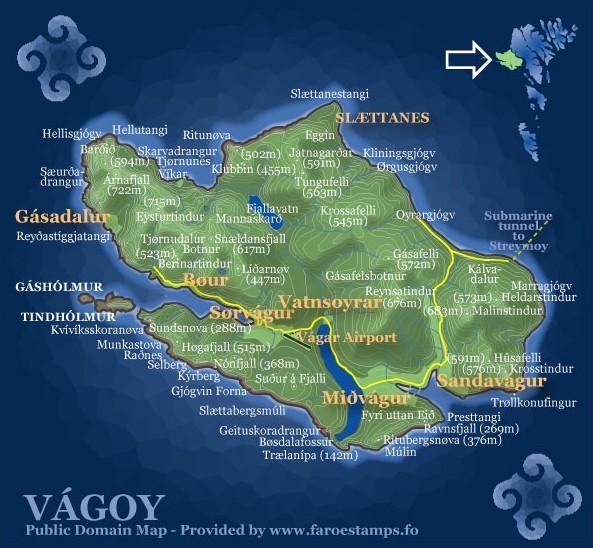|
Kjóvadalur .
Valleys of the Faroe Islands
Kjóvadalur is a small valley in the village Sørvágur on the Faroe Islands. Its name translates to 'the valley of the Kjógvi'. Kjógvi is the faroese form for the bird Arctic Skua. The river Skipá runs through Kjóvadal. Above Kjóvadal lies the mountain Nónfjall Nónfjall is a mountain on the island Vágar in the Faroe Islands. The mountain is located south of the village of Sørvá ... References [...More Info...] [...Related Items...] OR: [Wikipedia] [Google] [Baidu] |
Sørvágur
:''There is also a town called Vágur on Suðuroy.'' Sørvágur ( da, Sørvåg) is a village on the island of Vágar in the Faroe Islands. It is located at the landward end of Sørvágsfjørður. Sørvágur is the largest village in Sørvágur Municipality. Name The name Sørvágur translates to "The Bay of Sør". While the second half of the name makes sense given the fact that the village is located at a bay, the first half is more mysterious. Legend has it that the first man to settle at this place was called 'Sørli' and hence the village was named in honour of him. Another explanation on the origin of 'Sør' comes from the old-Norse 'Seyr' which is a word for sand (seyr is also a word for foggy rain). Sørvágur has quite a large sandbeach in comparison with other Faroese villages and towns, and therefore it was speculated that the original name of Sørvágur was ''Seyrvágur'', and during the course of time, Seyrvágur became Sørvágur. During the first half of the 20th c ... [...More Info...] [...Related Items...] OR: [Wikipedia] [Google] [Baidu] |
Nónfjall
Nónfjall is a mountain on the island Vágar in the Faroe Islands. The mountain is located south of the village of Sørvágur, near Vágar Airport and east of the mountain Høgafjall. The name Nónfjall translates to 'Noon mountain'. However, the Faroese use the word noon differently from the current English language, English usage. In the Faroese language noon refers to 15:00 in the 24-hour clock or 3pm in the 12-hour clock, whereas in the English language noon usually now refers to 12:00 or 12pm. If you are standing in the centre of the old village in Sørvágur at 15:00 you will see the sun above Nónfjall. Hence the name. Nónfjall lies above the valley of Kjóvadalur. References Mountains of the Faroe Islands {{Faroes-geo-stub it:Nónfjall ...[...More Info...] [...Related Items...] OR: [Wikipedia] [Google] [Baidu] |
Faroe Islands
The Faroe Islands ( ), or simply the Faroes ( fo, Føroyar ; da, Færøerne ), are a North Atlantic island group and an autonomous territory of the Kingdom of Denmark. They are located north-northwest of Scotland, and about halfway between Norway ( away) and Iceland ( away). The islands form part of the Kingdom of Denmark, along with mainland Denmark and Greenland. The islands have a total area of about with a population of 54,000 as of June 2022. The terrain is rugged, and the subpolar oceanic climate (Cfc) is windy, wet, cloudy, and cool. Temperatures for such a northerly climate are moderated by the Gulf Stream, averaging above freezing throughout the year, and hovering around in summer and 5 °C (41 °F) in winter. The northerly latitude also results in perpetual civil twilight during summer nights and very short winter days. Between 1035 and 1814, the Faroe Islands were part of the Kingdom of Norway, which was in a personal union with Denmark from 1 ... [...More Info...] [...Related Items...] OR: [Wikipedia] [Google] [Baidu] |
Arctic Skua
The parasitic jaeger (''Stercorarius parasiticus''), also known as the Arctic skua, Arctic jaeger or parasitic skua, is a seabird in the skua family Stercorariidae. It is a migratory species that breeds in Northern Scandinavia, Scotland, Iceland, Greenland, Northern Canada, Alaska, and Siberia and winters across the southern hemisphere. Kleptoparasitism is a major source of food for this species during migration and winter, and is where the name is derived from. Etymology The word "jaeger" is derived from the German word ''Jäger'', meaning "hunter". The English "skua" comes from the Faroese name ''skúgvur'' for the great skua, with the island of Skúvoy known for its colony of that bird. The general Faroese term for skuas is ''kjógvi'' . The genus name ''Stercorarius'' is Latin and means "of dung"; the food disgorged by other birds when pursued by skuas was once thought to be excrement. The specific ''parasiticus'' is from Latin and means "parasitic". Description Ide ... [...More Info...] [...Related Items...] OR: [Wikipedia] [Google] [Baidu] |
Skipá
Skipá is the name of two rivers in the village of Sørvágur in the Faroe Islands The Faroe Islands ( ), or simply the Faroes ( fo, Føroyar ; da, Færøerne ), are a North Atlantic island group and an autonomous territory of the Kingdom of Denmark. They are located north-northwest of Scotland, and about halfway bet .... The name Skipá translates to 'ship river'. Both rivers run in proximity to the harbour in Sørvágur, and hence the name. Rivers of the Faroe Islands {{Faroes-geo-stub ... [...More Info...] [...Related Items...] OR: [Wikipedia] [Google] [Baidu] |

